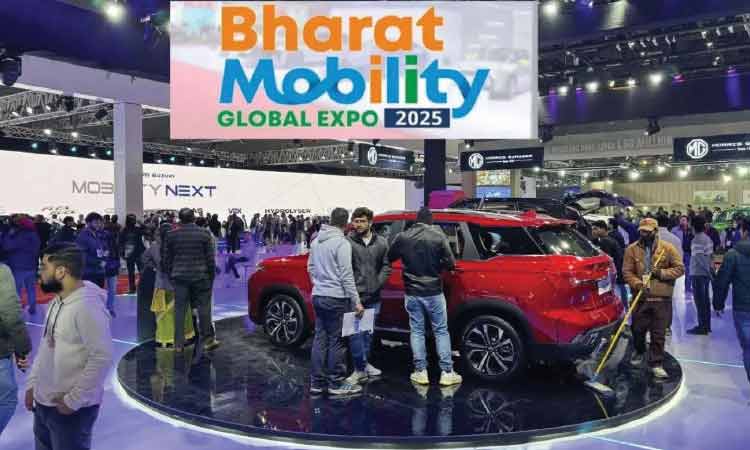The Bharat Mobility Global Expo 2025 in Delhi showcased 1,000 companies and international delegations, highlighting India’s booming auto component industry. The event emphasized growth in manufacturing, the shift to electric vehicles, & technological innovations. India’s focus on R&D, digitisation, & sustainability aims to transform the sector & boost exports to $100 billion in the next decade.
The components show at the Yashobhoomi Convention Centre in Delhi was full of people and companies jostling for space across five halls spanning 70,000 square metres. The Bharat Mobility Global Expo 2025 from January 17-22, organised by the Ministry of Commerce in collaboration with EEPC India, was the third-largest event of its kind. It featured over 1,000 companies, delegations from more than 40 countries, & country-specific pavilions, making it a truly global gathering.
Indian auto component companies exported to numerous countries last year, leveraging the industry’s cost competitiveness and exceptional precision engineering expertise to penetrate new markets. The government is actively collaborating with the mobility ecosystem to encourage innovation and technological upgrades within the sector.
“I had requested the auto component industry to aspire to grow from $20 billion in exports to $100 billion in the next 10 years. If the Indian component industry can achieve this target, I see a greater degree of Atmanirbharta and more Indian automobile companies becoming dependent on Indian manufacturers. It is India’s time, and it is for all of us at the auto component industry to grab the opportunity,” Commerce & Industry Minister Piyush Goyal said.
The auto component industry is experiencing remarkable growth, with the shift to electric vehicles (EVs) representing a transformative milestone. Technologies such as AI are enhancing quality, precision, and experimentation. To maintain this momentum, the sector must evolve from traditional supply chains to more advanced electro-mechanical models,” Minister of State for Commerce & Industry Jitin Prasada said.
India’s largest components show has a bold vision for the nation. Since India has upped its manufacturing aspirations through targeted policies and initiatives, the spotlight is now on the automobile sector. The motivations and ambitions of manufacturing companies are growing, as is evident with the $21 billion worth of exports in FY24.
The auto components industry is raising the bar for manufacturing with world-class quality. Its vision is to transform the sector into a technology-driven one that will prioritise investment in R&D, skill development, digitisation, and cost-effective automation. The sector recorded $74 billion in revenues in FY24.
The electric vehicle market could be the key to exponential growth. The industry could see an opportunity in the policymakers’ suggestion of a five-year action plan for a roadmap on the transition from existing internal combustion engines (ICE) to EVs.
Sustainability is also considered a top priority of the industry. Apex industry associations like ACMA are enabling member companies to carry out training activities to achieve carbon neutrality and sustainability to meet global standards.
At Yashobhoomi, one full hall was devoted to Bearings, a very vital component for the automotive sector. All bearing majors worth the name had their stalls at the expo, displaying and demonstrating their innovative products and solutions. They included NBC, Texspin, SKP, NRB, Delux, Schaeffler, Turbo, Hibond and more.
At Bharat Mandapam, ‘Green’ stole the show at the automobile extravaganza. Cutting across price points and brands, nearly all the big launches had a heavy dose of sustainability, as companies vied with each other to roll out clean cars in line with the government’s push for EVs.”India will be the global manufacturing hub for eVitara and this model will be exported to as many as 100 countries, riding on India’s quality of manufacturing & scale, said T. Suzuki, Suzuki’s Global President. Hyundai is taking steps to set up a charging infrastructure. We want to have 600 charging stations in the next seven years. For example, in Tamil Nadu, we are setting up 100 charging stations by 2027 & we will replicate that model in other states, said Unsoo Kim, MD, Hyundai India. “With relentless innovations and deep commitment to sustainability, Tata Motors is determined to accelerate the transformation towards a future that is greener and safer, declares Shailesh Chandra, MD of Tata Motors, Passenger Vehicles and EV Car Businesses. The company has reportedly sold over 2 lakh EVs in the country.
Bharat Mobility Global Expo 2025 was truly a great opportunity to platform India’s automotive aspirations, innovation, and sustainability, further laying the foundation for smarter, safer, and greener mobility.



